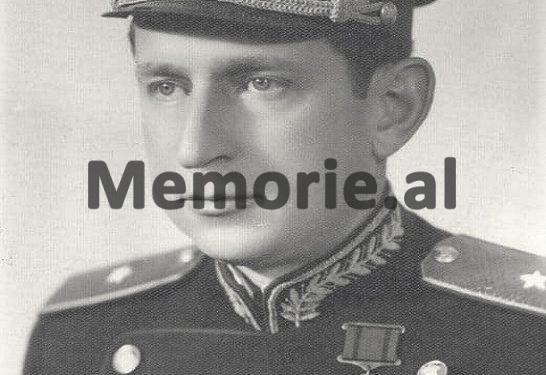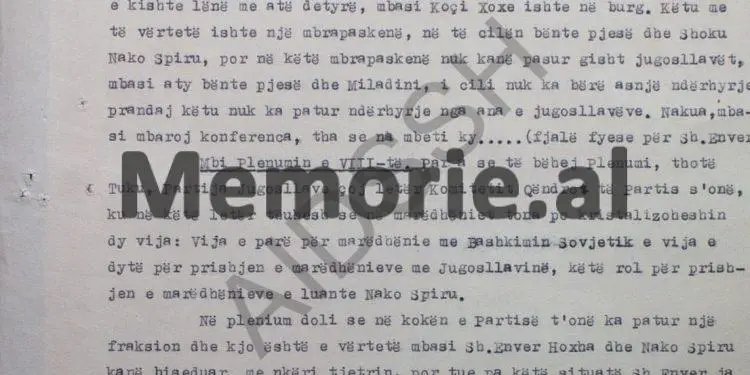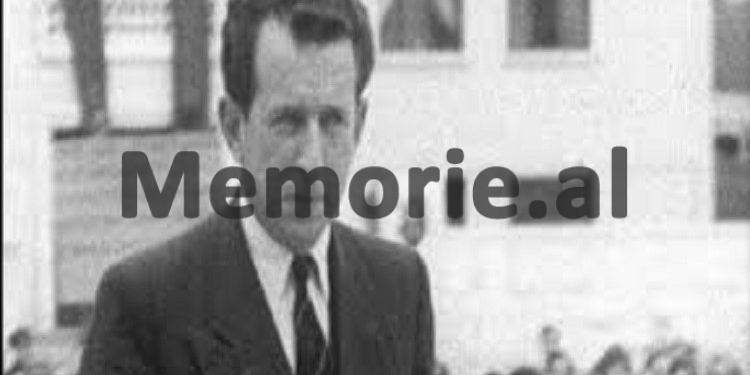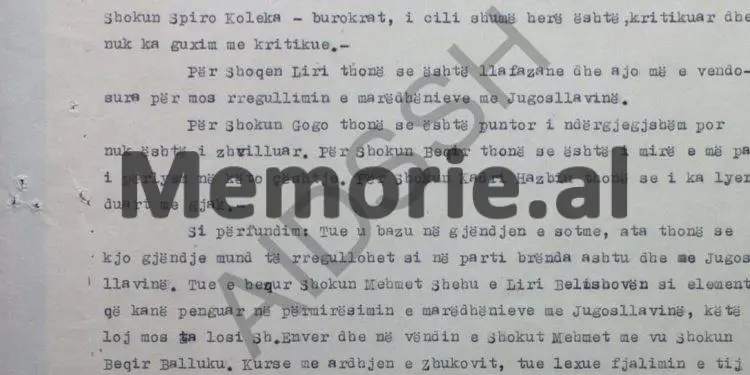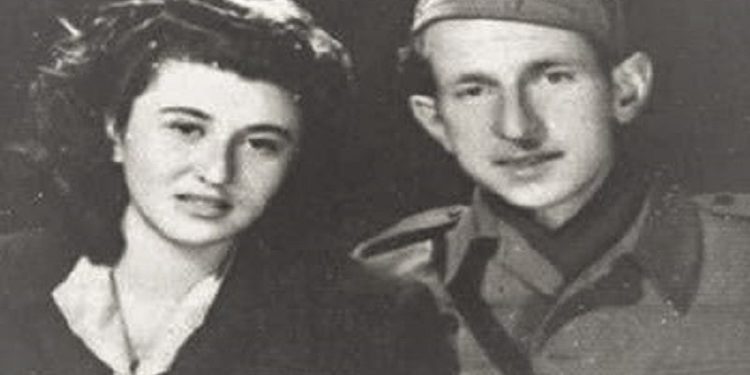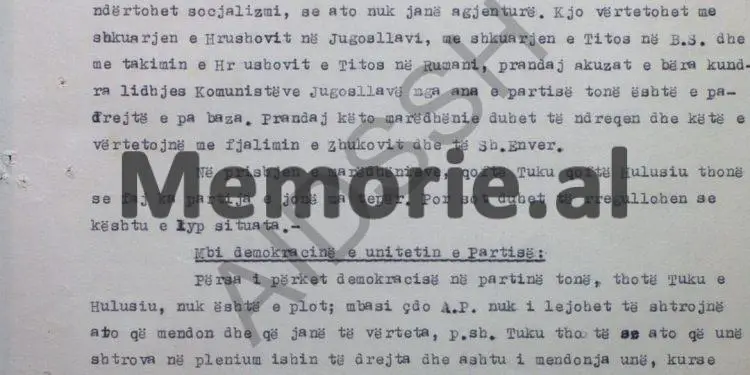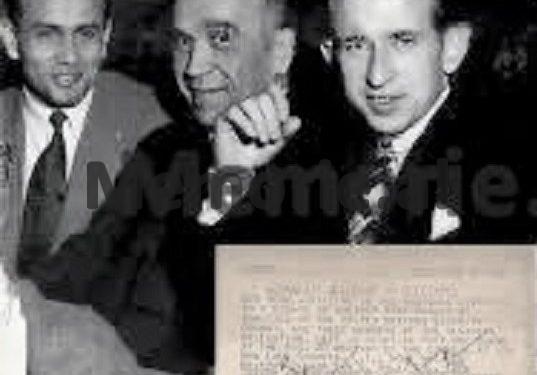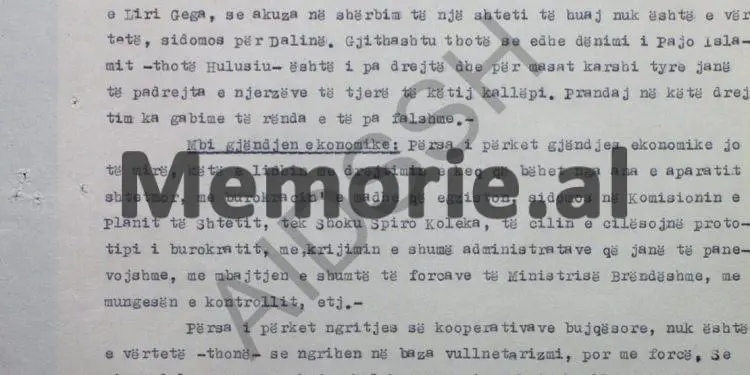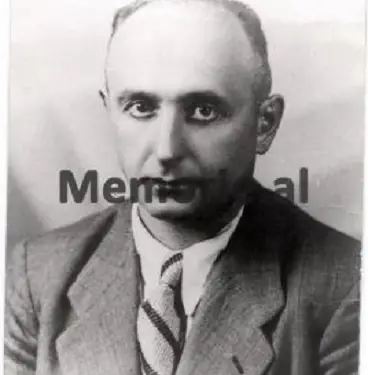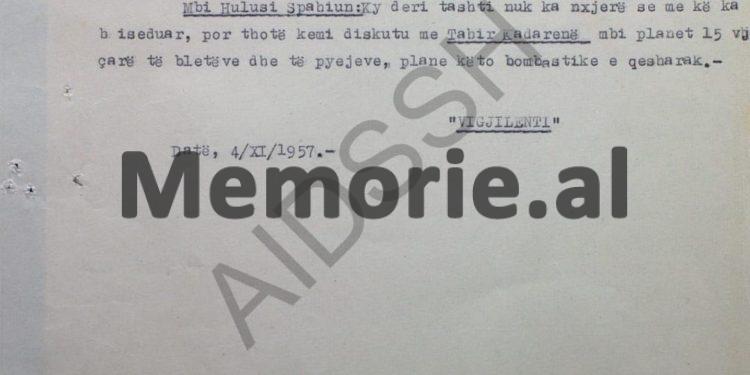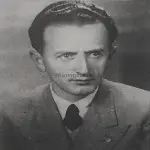Dashnor Kaloçi
Part sixteen
Memorie.al/publishes some archival documents issued by the institution of the Authority for Information of Former State Security Files, where there is a voluminous file belonging to Tuk Jakova, who since the period of Zog Monarchy, was one of the leaders of the Communist Group of Shkodra, sentenced to political prison in the famous trial of 1938, together with Qemal Stafa and Vasil Shanton, participant in the founding meeting of the Albanian Communist Party and member of its Central Provisional Committee, since the founding meeting of November 8, 1941, political commissar of the First Assault Brigade and the First Corps of the National Liberation Army, where from the end of the War, in November 1944 until 1955, he held several senior party and state functions and duties. , as: member of the Politburo and secretary of the Central Committee of the Albanian Communist Party, full ambassador of the People’s Republic of Albania in Belgrade, President of the Trade Unions of Albania, Minister of Finance and Deputy Prime Minister of the Albanian government, headed by Enver Hoxha, etc. The entire voluminous file (forms and investigative) that is published for the first time by Memorie.al., Where there are hundreds of unknown documents, in charge of the former lieutenant general Tuk Jakova, (“People’s Hero”), which belong to the period 1951-1959, when he, after numerous contradictions with Enver Hoxha since the end of the war, in 1951 was expelled as a member of the Politburo and in 1955, he was expelled from the Central Committee of PPSh, being dismissed from all party and state functions, which he had held until then, was interned with his family in the district of Berat, where after working for some time as head of the Carpentry Department in that city, in 1957 was sentenced to solitary confinement in Kanina Castle, Vlora district, where he was arrested in 1958, sentenced to 20 years in prison, accused of being a “traitor and enemy of the people”, until he died in the Prison Hospital of Tirana in 1959, in mysterious circumstances! What is said in the secret documents (reports, photographs, cards, forms, reports-information, notes, minutes, surveillance reports, plans-measures, denunciation letters, etc.) belonging to the period 1955-1959, when he was in constant surveillance and surveillance by the State Security bodies, who were the officers of the bodies of the Ministry of Internal Affairs, who were in charge of his surveillance and the names and nicknames of the Security collaborators, who kept him under strict control ?!
Continued from the previous issue
Report-information of the State Security Operational Officer, Raqi Zavalani, with the data of the Security collaborator with the nickname “Vigilance”, regarding the pursuit and surveillance of Tuk Jakova in the district of Vlora, where he was interned
Vlora, on 4.11.1957 Received from P.Op. Raqi Zavalani
Given by B.p. “Vigilant”
R E P O R T
On the democracy and unity of the Party:
As for democracy in our Party, says Tuku and Hulusiu, it is not complete; as each A.P. he is not allowed to say what he thinks and what is true, for example, Tuku says that what I said in the plenum was right and I thought so, and me, why did I say this, got all this the masses, the Leninist norms in the Party have been broken, they expel Mita, as if the landowner expelled the farmer from the farm, so Liri Belishova expelled him.
The Tirana Conference is pressed, why there the comrades ask the right questions, such as the case of the relations with Yugoslavia, discuss the economic situation of the country, ask about the work of Koçi Xoxe and measures are taken against them until their exile. Hulusi also says the same about what he talked to sh. Beqir Balluku and later after he was called by the basic organization of the Party. At the Tirana Conference, says Hulusiu that the Yugoslavs did not intervene, but this is slander.
In terms of unity and this is lacking, as in the plenum there is no criticism or self-criticism on the shortcomings, as the members of the plenum are afraid, e.g. to criticize sh. Mehmet, or sh. Enver, but they make amen, from this arises the cult of the individual, e.g. sh. Mehmet tells his friend Koço Theodhosi that if he does not do this job, he will depend on maple.
On socialist legitimacy:
There are many mistakes in socialist legitimacy, says Tuku and Hulusiu. This should start from Koçi Xoxe, who in their opinion, should not be shot. For Njazi Islam who killed himself, says Tuku, has not been an enemy. As for Sali Ormeni, he says that he was killed and it is not true that he killed himself.
They also say that; Dali Ndreu and Liri Gega were shot without any guilt, that the accusation ‘in the service of a foreign state’ is not true, especially for Dalia. It also says that; even the punishments of Pajo Islam, says Hulusiu, is unjust and for the measures against them are unjust, of other people of this mold. Therefore, there are serious and unforgivable mistakes in this regard.
On the economic situation:
Regarding the bad economic situation, they had this with the bad direction that is done by the state apparatus, with the great bureaucracy that exists, especially in the State Planning Commission, in sh. Spiro Koleka, who is considered the prototype of the bureaucrat, with the creation of many administrative links that are unnecessary, with the retention of many forces of the Ministry of Interior, with the lack of control, etc.
As for the establishment of Agricultural Cooperatives, it is not true, they say, that they are established on a voluntary basis, but by force. That he who comes out hinders, they make kulak. As for the proclamation of the kulaks, it was not right, says Tuku, the Central Committee’s instruction issued in 1949. And the removal of the trisk is considered a political success, but Hulusiu says that; if we compare the standard of 1938, it was better, since the value of the ALL then with today is 1 to 40 ALL today.
About Sejfulla Malëshova and Ymer Dishnica:
If we look today at what Sejfulla Malëshova has laid out, says Tuku and Hulusiu, many issues turn out to be right, based on how China’s friends are working, while our Party still today, after 11 years, calls it an enemy and servant of the bourgeoisie. . As for Ymer, says Hulusi, they told him to act in Mukje, and then they took measures and today they call him an enemy, who agrees, and is serving the people very well.
On leadership:
Regarding the leadership, they talk especially badly about Comrade Enver Hoxha, he said; meat with two eyes. They say that during the war, he took refuge among the traders Selfua and Omari, that during the war he just hid and we remained in search, he does not think at all about the state of the country, but everything they do as in the Soviet Union, you do not think how suits the country and applies the Soviet experience in a template way, so it is for collectivization, for the state apparatus, etc.
It is an element that does as they say and changes the plate just to secure the place it has.
Mehmet Shehu is said to be an extremist, a careerist.
For Comrade Spiro Koleka, the bureaucrat, who has been criticized many times and has no courage to criticize.
For her friend Liri, they say that she is talkative and the one who is most determined not to normalize relations with Yugoslavia.
For Comrade Gogo, they say he is a conscientious worker, but he is not developed.
For Comrade Beqir, they say that he is good, and we are less tainted in these matters.
For comrade Kadri Hazbiu, they say that he painted his hands with blood.
In conclusion: Tue was based on the present situation, they say; this situation can be regulated both within the party and with Yugoslavia. Tue removed comrade Mehmet Shehu and Liri Belishova, as elements that have hindered the improvement of relations with Yugoslavia, do not play this game sh. Enver and in the place of sh. Mehmet, me vu sh. Beqir Balluku.
And with the arrival of Zhukov, you read his speech and that of sh. Enver, they say that now the relations with Yugoslavia should be normalized, after the Soviet comrades provide it, but this relationship will be regulated without taking measures against the persons, as the political situation demands.
On Tuk’s relations with Bedrina, Dhorë and Xhafer Vokshi:
From the discussions so far, it has emerged that Tuku went to Bedri Spahiu in Elbasan and discussed the following issues:
- On the measures taken against them, which they called unjust.
- On relations with Yugoslavia.
- On the rehabilitation of Koçi Xoxa.
- On Leninist norms in the Party. At that meeting they stayed very late and after the lights went out, they sat by candlelight.
With Xhafer Vokshi:
They met in Berat, I do not know for sure, at the time when the Tirana Conference was taking place, where Xhaferi told them; do you want to write a letter to the Conference, and Tuku has responded; no, but if you call me, I will go.
With Dhora Lekë:
There were more frequent meetings with this person, which informed Tuku about the relations with Yugoslavia, after she, as Tuku says, met with Cveton.
Tuk’s wife, Mita, also met Cveton. Dhora also went to Bedri and asked Frano Jakova for the VIII Plenum Resolution, which he found and gave.
About Hulusi Spahiun:
He has not yet revealed who he talked to, but says; we discussed with Tahir Kadare, about the 15-year plans of bees and forests, these bombastic and funny plans./Memorie.al
Date 4 / XI / 1957 “Vigilant”
The next issue follows




